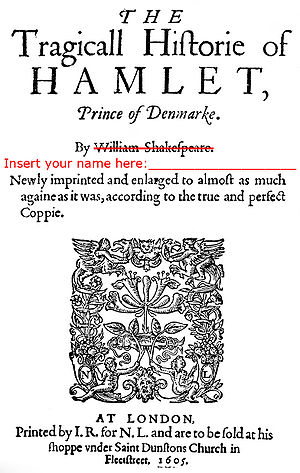 |
| Image via Wikipedia |
The blogger, I am afraid, may have cried wolf; but since there are no details …. The academics seemed to be concerned more with ideas, and who said what first, than with anything else. The concept of “idea plagiarism” is weird. Some people seem to think ideas are as unique to people as their fingerprints. Nothing could be further from the truth. The U. S. Copyright Office has a Copyright Basics document available, which explicitly states that: “ideas, procedures, methods, systems, processes, concepts, principles, discoveries, or devices, as distinguished from a description, explanation, or illustration” are not copyrightable. (Copyright Basics, p. 3) It is best to leave it to a judicial court to decide what copyright infringement is.
If you care about the uniqueness of your writing, however, there are a number of web-applications that can help you decide whether you are plagiarizing or copying someone else’s words. I will briefly look at a few of them here.
The Writing Checker Tools
The first one, which I have used extensively, is CopyScape. It has a very simple submission process to find out whether your writing, or someone else’s, is duplicated on the web. I tried it again, recently, with a couple of pages of my older writing. The samples I chose use direct quotes from another page, so I expected some hits. The CopyScape search did not find those other pages, however, since they have been taken down.
The second tool, DocCop, is a more in-depth search tool. It can compare files as well as submitted text to existing web pages. I ran the same samples as web checks, but it also did not find any significant matches.
The third tool, PlagiarismChecker, is similar to DocCop and CopyScape, but limits the input to a short string of text. It also does not check files, like DocCop does. The results, as expected, were nil.
Comments about the Tools
DocCop’s search found a number of common phrases from one of my samples in other pages. “most people do not know how to access the best,” and “and satisfactory service to clients may be just as important as credentials.” These strings can hardly be said to be plagiarism, though since they are generic “satisfactory service,” “most people,” and sort of like slogans, “access the best.” The latter phrase could be called a non-copyrightable term. Did I plagiarize these other writers? I hardly think so, because in the context of the terms used, the overall subject of the writing was different. Hmmm.
One consideration with these tools is that they only check publicly available and indexed web content. DocCop uses Microsoft’s Bing, and the others use Google and Yahoo. If a document has not been on the web for very long, or the web indexers have not found it, then it will not be picked up by these tools. Some web sites also limit the web indexers by telling them to ignore certain pages within sites, causing the potential for negative results when in fact there is duplicate content available.
Another consideration with these text checkers is that, like the Google, Yahoo, and Bing web indexers, they cannot understand the context and meaning of what is being checked. I used a plagiarism checker several years ago, that came up with a kindergarten teacher’s class plan as a potential source of my genealogical text. Was that plagiarism, or was it just the mixed up alphabet appearing in a similar sequence? It takes humans to fit those pieces together. As I mentioned earlier, it is best to have a judicial court decide.
NPM
© 2012 N. P. Maling – Zen C&S MM

No comments:
Post a Comment